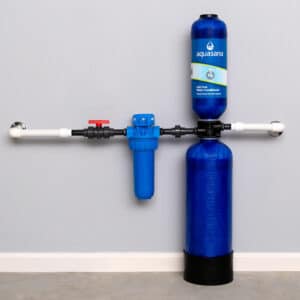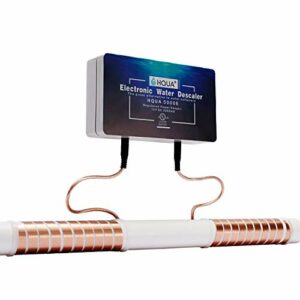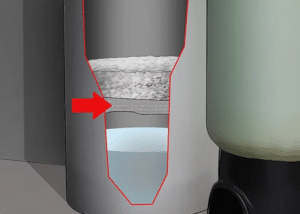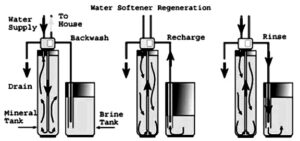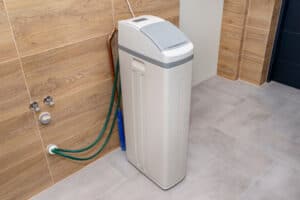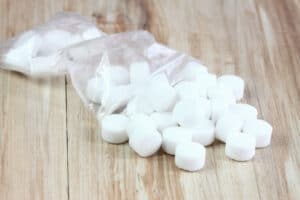If your water supply is full of minerals, a salt-based water softener is valuable. It can transform hard water into soft water that prevents mineral buildup and other harm from the hard water supply.
Let’s get the hard truth out of the way first. Softener salt is not food, and you should not eat it. But there are many uses for softener salt that might help you use an excess or save money.
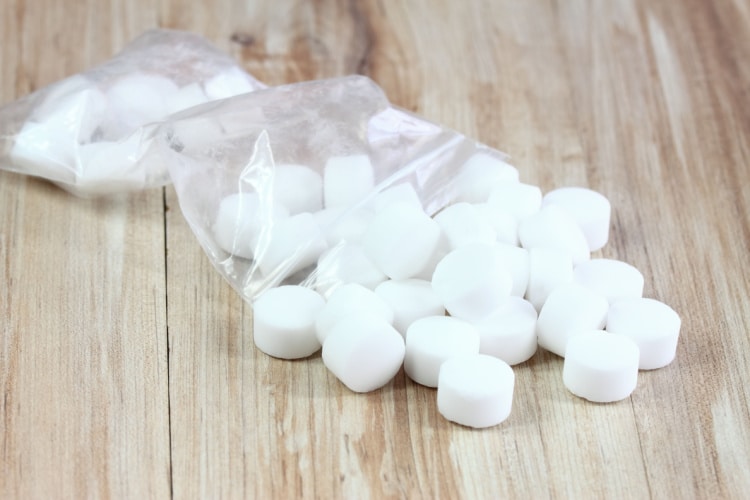
Can You Eat Water Softener Salt?
We’ve all been there. You reach for the table salt and find out that it’s empty. Whether it was you or a housemate that used the last bit doesn’t matter. The point is that you’re out of salt and would like to add some to your food.
For those of us with soft water treatment systems that use softener salt, it might bring up a valid question. Can you eat water softener salt? After all, if you have this system in your house, you likely have giant bags of this salt around.
The answer is no, you should not eat water softener salt. While it is somewhat similar to table salt, softener salt is not meant for ingestion. You should not consume it. Doing so can result in stomach aches and other issues. It is not a food product.
Table Salt vs. Water Softener Salt Difference
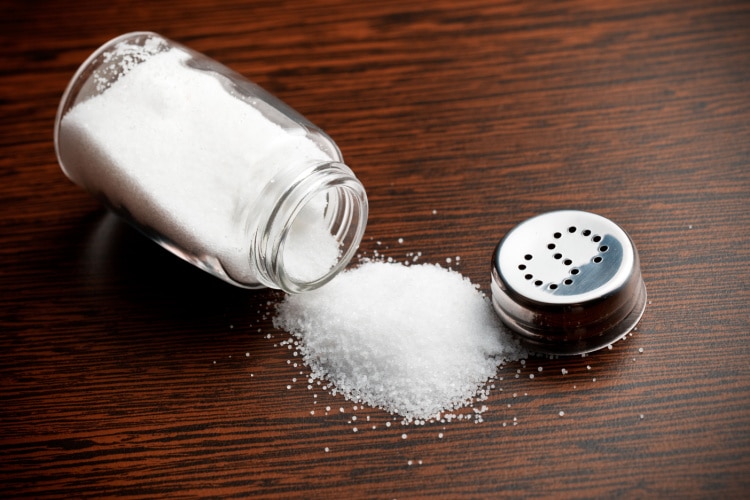
Now that we know the answer to, “Is water softener salt edible?” is no, let’s take a closer look at why. After all, how different can it be from the table salt we all know and love?
What Is in Table Salt?
Table salt is a big part of our lives. It is an essential part of our diet. If you were to avoid eating salt entirely, you would suffer serious health problems. It’s also important not to overdo it, but that can be a challenge today as many foods are heavily salted.
Have you ever taken the time to think about what’s in your table salt? It seems like it would be straightforward, right? And it usually is.
The majority of table salt is mostly sodium chloride. That is the name of the chemical compound we call salt.
Some table salts have added ingredients. One of the most common is iodine, which can be lacking in some diets. Using iodized salt can help avoid iodine deficiency. But should be used with care because too much iodine can be problematic too.
It’s also worth noting that table salt is usually highly refined. Table salt manufacturers refine it to remove dirt and other impurities, so you know what you’re getting. It’s not full of rocks or other things that can be part of the mining process.
What Is in Water Softener Salt?
Water softener salt isn’t identical to table salt. While it contains sodium chloride, it also usually has unprocessed potassium chloride. This aspect can be a useful ingredient, but you should only ingest it when it is processed and turned into a food-safe product.
Softener salt has another difference compared to table salt. It is likely to be less processed and has more dirt and other impurities when compared to table salt.
These impurities can be harmless in small quantities when added to water to make it soft. But if directly consumed in the same way as table salt, it can be problematic.
One of the issues could be the dirt or small rocks that might be in softener salt. While this is not a problem for the water softener system, it can cause many issues when you eat it. The biggest concern is damage to your teeth, which can be extremely painful and costly.
But the other impurities can be harmful when consumed directly. Whether it’s some dirt or other unknown compounds, water softener salt might contain more impurities than you should eat.
Is Water Softener Salt Poisonous?
There is an important distinction that’s worth making here. You shouldn’t ingest water softener salt directly. That might cause you to think that it is poisonous.
But it isn’t. Water softener salt isn’t meant for consumption, but it does not contain any poison.
This fact might cause you to scratch your head a little bit. If it’s not poisonous, what’s the harm in eating it?
The main issue is that water softener salt is for a particular non-food purpose. It helps reduce the mineral content and transforms hard water into nice silky-smooth soft water. Since it is added to your water supply, you would think it’s safe to eat.
In some ways, that is true. But directly consuming it is much different than ingesting the minuscule bits in your water supply after being treated by a salt-based water softener.
Because water softener salt is not a food product, it doesn’t go through the same testing and standards that food products do. But this doesn’t mean it contains anything considered poisonous to humans.
Other Uses for Water Softener Salt
If you are trying to get rid of excess softener salt, this article might be letting you down so far.
And now you know you shouldn’t eat it and can avoid the stomach ache or other problems that can come from eating something that’s not produced to eat.
But there’s some good news. Water softener salt has many other benefits and uses beyond water treatment. While it should be out of the kitchen and off your food, there are other areas where it can come in handy.
Melting Ice on Streets, Driveways, and Sidewalks
When winter rolls around, it’s time to break out the snow shovels, blowers, and salt. These tools help keep your driveway, sidewalks, and streets free from hazardous snow and ice.
Can you use water softener salt to melt ice? Yes, you can. It will do an excellent job at melting ice, just like ice melt products can do. Both have limitations since salt water does freeze. But salt water freezes at a lower temperature than salt-free water.
So what is the difference between water softener salt vs. rock salt for melting ice? It depends on the manufacturer and specific product, but generally speaking, rock salt for melting ice usually isn’t as pure as water softener salt.
Rock salt has more contaminants than water softener salt. Sometimes companies specifically add other ingredients to rock salt to provide more traction, such as small stone-like objects. These objects can help provide more friction between the surface of your shoes and the ice.
But here’s where it gets interesting. Even though water softener salt is usually purer, it is also commonly priced lower. That’s right, you can save money by using your excess water softener salt to melt your ice.
Why is this the case? It’s likely just a target-specific pricing model or other inherent characteristics in the rock salt that cause a higher price.
Sometimes products can be priced vastly differently, especially since these two products are marketed in completely different ways.
Killing Weeds and Unwanted Plants
Salt is a crucial part of life for many species. But when too much salt is in nearly anything, the results can be detrimental. This fact is not only true for humans and a critical part of why our diets should have some salt without too much, but it’s also true for plants.
But you can use this to your advantage. Just like how you can add a ton of salt to ruin just about any food, you can add salt to plants to create a situation where the plant won’t live.
If you have a problem with plants growing where they shouldn’t, such as annoying weeds or grass growing in undesired spots, you can use water softener salt to kill them.
You’ll want to start small when using salt in this way. As the salt breaks down and gets absorbed into the water, soil, and plants, it can spread. Don’t use too much, as it can be extremely challenging to remove.
But a light sprinkle can do wonders. It is a viable alternative to more harmful chemicals as long as you use it sparingly.
Use as Barrier to Keep Pests Out
Salt can also be a tool for keeping pests out. If you have a garden that keeps getting overrun with small creatures, such as snails, you can use salt to help fix this problem.
Put down a barrier of water softener salt around the garden area you want to protect. You’ll want to be careful because it can hurt your plants and soil. But a line of softener salt can help keep out unwanted pests from your garden.
They will avoid breaching this line of salt and can help keep your garden free from this type of pest.
Is Water Softener Salt Edible? Wrap Up
We’ve now learned the answer to, “Is water softener salt edible?” is no. Water softener salt usually contains additional chemical compounds when compared to table salt, more dirt, and impurities, and is not meant for human ingestion as table salt.
But all hope is not lost. You can use water softener salt for many other uses. These include keeping your driveway, sidewalks, and streets free of ice in the winter, as well as killing weeds or plants on your property. It can also be used as a barrier to keep unwanted pests out.

